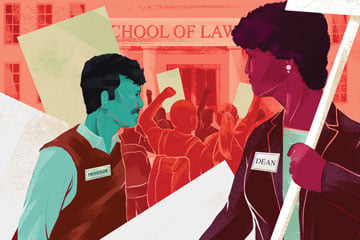Law schools that want to promote political viewpoints are misled about their purpose.

Law schools that want to promote political viewpoints are misled about their purpose.
On February 2018, an all-white jury in Saskatchewan acquitted a white man, Gerald Stanley, of murdering an Indigenous youth, Colten Boushie. The acquittal attracted much attention. Many felt that justice had not been done. Many felt that racism lurked behind the jury verdict. Some law schools joined the chorus of indignation. In the forefront was the University of Windsor Law Faculty. It issued a statement that said in part: “What happened to Colten Boushie and law’s response to his murder are tragic, unnecessary and unacceptable. We stand with Colten Boushie’s family. We stand with Red Pheasant First Nation. We stand with Indigenous Peoples. We stand with Indigenous scholars, students, activists and families who remind all of us of our moral responsibilities as guests in the Territories of the Three Fires Confederacy to generate change.” Several other law schools, deans of law and law professors across the country expressed similar sentiments in a less formal and portentous way. Some of these professors and institutions have since been described as “social justice warriors” (a dubious compliment given the history of that descriptor — see, for example, its definition in urbandictionary.com).
Not everyone was convinced that law schools should get involved. Writing in the National Post, Bruce Pardy, a law professor at Queen’s University in Kingston, said, “Legal education has lost its way. One could be forgiven for thinking that the purpose of law schools was to train lawyers to understand legal principles and to think logically and critically. Instead, some law schools portray themselves as political actors working for a cause.” Two of Pardy’s Queen’s law school colleagues, professors Lisa Kerr and Lisa Kelly, fired back in The Globe and Mail. “Calls for a return to legal formalism — a legal education free of politics — are themselves deeply political. Stripping law of context allows supporters of the status quo to portray legal rules as neutral or apolitical.”
No one who has thought about it for more than a minute will deny that law exists in a broad political, cultural, historical, ethical and social context. Law reflects and influences society. We all know that. The proper study of law recognizes and explores this complex relationship. In law schools, the relationship is dealt with, for better or worse, in courses that specifically address the issue (e.g., legal history, law and economics, legal philosophy) and interstitially in other subjects (e.g., how tax law works to redistribute wealth). But, apparently, some law schools want to go further and promote explicit political agendas.
Many law students will not be too keen on this development (some, of course, will embrace it with fervour). Almost all law students intend to practise law and are in law school to learn how to do it. To them, anything else is peripheral, if not irrelevant and unwelcome. The irony is that most law professors are theoreticians with little or no experience practising law. As a result, they often don’t give the students what they want. That’s true in spades if, perhaps to fill the gap, professors pursue a political agenda in the classroom and law schools try to become political actors. It’s a recipe for frustration and trouble.
For one thing, a law school that promotes a specific political agenda ignores the political autonomy of its students. Some students will agree with the agenda, others will not, yet they will all be lumped together. Those who don’t agree may feel pressured to conform. Christie Blatchford in the National Post reported the comments of a law student whose dean, in an email message to students, condemned the Stanley decision. This student had a somewhat different and complicated view of the case. “The dean’s message made clear, these kinds of ideas are not acceptable. All 12 of the jurors were bigots. As students of the faculty, we had our marching orders. The decision was racist and so is our legal system.”
There is also the danger of dubious trading on expertise. A statement by a law faculty on a legal matter carries weight. Presumably, the professors in a law school know a lot about the law and the legal system. We should pay attention to what they say. But expertise has its limits. Does a law school’s collective legal knowledge make its view on, say, racism particularly compelling? As I wrote in an earlier column in this magazine, “If you win the Nobel Prize for, say, chemistry, suddenly everyone wants your views on, I don’t know what, maybe world peace. Why being a whiz at infrared chemiluminescence makes you an expert on nuclear disarmament is not clear . . .”
Some might argue that law schools have a positive obligation to sensitize students to political and social issues, to get them fully involved in the big controversies of the day, to insist that they commit to particular progressive points of view. Not to do so — to produce politically neutral, indeed neutered, graduates — would be, so the argument goes, to abdicate responsibility and fail in the mission. It would also ignore the inherent political nature of some legal rules. But this line of thinking misses the mark. Education should teach us how to tell a good argument from a bad argument, not promote a particular argument. Adopting specific arguments can wait for later, once our knowledge is greater and our sensibilities are refined.
There’s a lot of law. The Great Library at Osgoode Hall in Toronto holds about 120,000 volumes. The Bodleian Law Library at Oxford has almost half a million. To know and understand even a little of all this takes a big effort. The task is made easier if it is guided by those who are wise, knowledgeable and objective. The law school and its professors are there to teach the law as it is. Learning comes first. Ideology can come later. ![]()
Philip Slayton’s latest book, How To Be Good: The Struggle Between Law and Ethics, was published in October.











